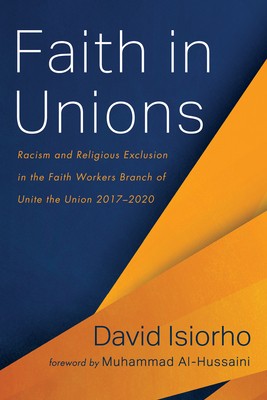
- We will send in 10–14 business days.
- Author: David Isiorho
- Publisher: Resource Publications (CA)
- ISBN-10: 1532699174
- ISBN-13: 9781532699177
- Format: 15.2 x 22.9 x 1 cm, hardcover
- Language: English
- SAVE -10% with code: EXTRA
Reviews
Description
Faith in Unions is a personal account, representing a critique of Whiteness and Black marginality in the Faith Workers Trade Union. In short, it is a Black theology critique of the way Muslim and Hindu faith workers have been treated in the British Labour movement. This book clearly has things to say about discriminatory practices, which puts the discussion about Englishness and Britishness into a wider context. I am suggesting a political agenda associated with English ethnicity as the mode of involvement to explain policies that are likely to result in racialised religious exclusion. Faith in Unions gives focus to Muslim and Hindu workplace groupings within the Faith Workers Branch and the opposition to their formation from Anglican and Methodist Christian members. I am concerned with the struggle for faith recognition within a discriminatory and institutionally racist union structure. This book offers an explicit exploration of what I mean by ""the racialised other"" in the context of the British Labour movement. In this we need to understand the ways historical Christianity has defined Black identities. My conclusion hopefully will start a wider discussion of Englishness and English exclusivity.
EXTRA 10 % discount with code: EXTRA
The promotion ends in 16d.06:46:37
The discount code is valid when purchasing from 10 €. Discounts do not stack.
- Author: David Isiorho
- Publisher: Resource Publications (CA)
- ISBN-10: 1532699174
- ISBN-13: 9781532699177
- Format: 15.2 x 22.9 x 1 cm, hardcover
- Language: English English
Faith in Unions is a personal account, representing a critique of Whiteness and Black marginality in the Faith Workers Trade Union. In short, it is a Black theology critique of the way Muslim and Hindu faith workers have been treated in the British Labour movement. This book clearly has things to say about discriminatory practices, which puts the discussion about Englishness and Britishness into a wider context. I am suggesting a political agenda associated with English ethnicity as the mode of involvement to explain policies that are likely to result in racialised religious exclusion. Faith in Unions gives focus to Muslim and Hindu workplace groupings within the Faith Workers Branch and the opposition to their formation from Anglican and Methodist Christian members. I am concerned with the struggle for faith recognition within a discriminatory and institutionally racist union structure. This book offers an explicit exploration of what I mean by ""the racialised other"" in the context of the British Labour movement. In this we need to understand the ways historical Christianity has defined Black identities. My conclusion hopefully will start a wider discussion of Englishness and English exclusivity.


Reviews